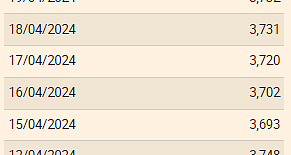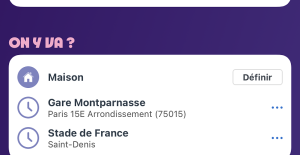Most consumers notice immediately that prices are currently rising in supermarkets and discounters. Thousands of products have skyrocketed in price over the past few months, many even more than once. But the amount marked on the shelf is not always the decisive factor.
With an increasing number of articles, there are hidden price increases - due to a reduction in the filling quantities and pack sizes. Customers then simply get less content for the same price. Experts call this phenomenon “shrinkflation”. The term is made up of the English word "shrink", which means "shrink" and "inflation".
A current example of shrinkflation are the bags of crisps from the Funny-Frisch brand. Manufacturer Intersnack recently reduced the capacity from 175 to 150 grams. The large pack, on the other hand, now only contains 215 instead of 250 grams, and the small packs weigh 40 instead of 50 grams. "These are hidden price increases of 16 to 25 percent," calculates the Hamburg consumer advice center and voted Funny-Frisch "deceptive pack of the month" in November.
Intersnack justifies the new grammages with enormous cost increases. "The prices for raw materials including packaging and logistics have risen immensely," says a statement from the Cologne-based company. In addition, there would be continuously rising costs for energy, which would particularly affect Intersnack as a manufacturer of energy-intensive, fried and baked products. "In order to be able to continue to meet our high quality standards, we were forced to compensate for the increase in costs by adjusting the grammage."
This decision was not easy for the company. "We see these adjustments as an extraordinary step in challenging times." However, Intersnack does not want to know anything about deceptive packaging. "The reduction in the filling quantity can be seen from the associated smaller packaging and the labeling of the quantity for our consumers."
And not only at Funny-Frisch. According to the Hamburg consumer advice center, Intersnack has also reduced the filling quantities of other brands, such as chips and tortillas from Chio or nut products from Ültje. "More than 30 snack items are likely to be affected," report the consumer advocates, who have also identified a domino effect.
"One provider starts, the others follow suit," says Armin Valet, head of the Food and Nutrition department at the Hamburg Consumer Center. "We found at least 63 snack products from the four most important suppliers with this trickery." Pringles from the manufacturer Kellogg Company, Lorenz Snack-World with the brands Crunchips and Nicnac's and Pepsico with Lay's and Doritos are also affected.
This shrinkflation is likely to have been preceded by tough negotiations with retailers. Because the tone is currently getting rougher between dealers and manufacturers. Lionel Souque, for example, the head of the Rewe Group, which includes the supermarket chain of the same name as well as the discounter Penny, openly accuses a number of brand manufacturers of price gouging. "Most of the industry behaves properly and is sensible," reports the manager. "We will then also accept price increases."
After all, there are understandable cost increases for raw materials, packaging, energy, logistics and personnel. "But there are also many free riders who surf the price wave and simply want to improve their results," complains Souque, meaning "above all the large, international, listed consumer goods groups".
Products from the US food giant Mars, which, in addition to chocolate bars, also sells pasta dishes and animal feed, are currently missing from the shelves of both Rewe and Edeka. And there is also a public dispute with Coca-Cola, which has even led to the delisting of industry leader Edeka. Rewe, in turn, is also driving the chips issue.
Souque reported in September that Intersnack had asked for high prices and also announced that it would reduce the filling quantity of the chip bags from 175 to 150 grams and publicly complained about it. The bottom line is that Intersnack demanded an increase of 22 cents per 100 grams due to cost increases. “But with our own brand, we only get five cents.
So I ask myself where the 17 cent difference comes from.” And he knows the background very well. "Because we have a large number of suppliers, are active in different countries and also have a deep insight into calculations thanks to our own brands, we can understand what is justified and what is not."
From the point of view of consumer advocate Valet, however, it is not only the brand suppliers who are conspicuous by shrinkflation. For a long time, dealers pointed the finger at the industry when there were hidden price increases, says expert Valet. In the case of private labels, they have long been shrinking the content themselves.
In any case, the Hamburg consumer advice center is reporting an increasing number of complaints about private labels. "With a share of around 14 percent, only comparatively few private labels were found in our list of deceptive packaging in the past two years," reports Valet. "But in the first six months of this year it was already 25 percent."
For example, the consumer advice center listed Jack's Farm lamb steaks from Aldi Nord and Süd in the summer, the pack content of which was reduced from 400 to 300 grams, and an organic wood-fired pizza with mozzarella, spinach and feta at the discounter Penny with 410 instead of 460 grams with a price increase of 50 cents at the same time or the Olivano's lentil bulgur salad Pikant from the Edeka subsidiary Netto Marken-Discount, the filling quantity of which was reduced from 250 to 200 grams with a simultaneous price increase from 89 to 99 cents.
However, the cases of well-known branded products are more effective in terms of publicity. The Hamburg consumer advice center names soap from Dove, washing-up liquid from Pril, sauces from Knorr, Piasten chocolate lentils and the margarine Rama from Upfield, which only made it to the sham pack of the month in August. Despite the cup being the same size, the pack no longer contains 500 grams, but 400, which corresponds to a price increase of 25 percent.
At the same time, the filling quantities at Sanella, Becel and Lätta were also reduced. There is a simple logic behind this method: by changing the pack sizes, retailers and manufacturers want to ensure that certain price thresholds are not breached, which could ultimately prevent customers from buying certain products.
"Everything on shares" is the daily stock exchange shot from the WELT business editorial team. Every morning from 5 a.m. with the financial journalists from WELT. For stock market experts and beginners. Subscribe to the podcast on Spotify, Apple Podcast, Amazon Music and Deezer. Or directly via RSS feed.

 The Euribor today remains at 3.734%
The Euribor today remains at 3.734% Germany: the trial of an AfD leader, accused of chanting a Nazi slogan, resumes this Tuesday
Germany: the trial of an AfD leader, accused of chanting a Nazi slogan, resumes this Tuesday New York: at Columbia University, the anti-Semitic drift of pro-Palestinian demonstrations
New York: at Columbia University, the anti-Semitic drift of pro-Palestinian demonstrations What is Akila, the mission in which the Charles de Gaulle is participating under NATO command?
What is Akila, the mission in which the Charles de Gaulle is participating under NATO command? What High Blood Pressure Does to Your Body (And Why It Should Be Treated)
What High Blood Pressure Does to Your Body (And Why It Should Be Treated) Vaccination in France has progressed in 2023, rejoices Public Health France
Vaccination in France has progressed in 2023, rejoices Public Health France Food additives suspected of promoting cardiovascular diseases
Food additives suspected of promoting cardiovascular diseases “Even morphine doesn’t work”: Léane, 17, victim of the adverse effects of an antibiotic
“Even morphine doesn’t work”: Léane, 17, victim of the adverse effects of an antibiotic MEPs validate reform of EU budgetary rules
MEPs validate reform of EU budgetary rules “Public Transport Paris 2024”, the application for Olympic Games spectators, is available
“Public Transport Paris 2024”, the application for Olympic Games spectators, is available Spotify goes green in the first quarter and sees its number of paying subscribers increase
Spotify goes green in the first quarter and sees its number of paying subscribers increase Xavier Niel finalizes the sale of his shares in the Le Monde group to an independent fund
Xavier Niel finalizes the sale of his shares in the Le Monde group to an independent fund Owner of Blondie and Shakira catalogs in favor of $1.5 billion offer
Owner of Blondie and Shakira catalogs in favor of $1.5 billion offer Cher et Ozzy Osbourne rejoignent le Rock and Roll Hall of Fame
Cher et Ozzy Osbourne rejoignent le Rock and Roll Hall of Fame Three months before the Olympic Games, festivals and concert halls fear paying the price
Three months before the Olympic Games, festivals and concert halls fear paying the price With Brigitte Macron, Aya Nakamura sows new clues about her participation in the Olympics
With Brigitte Macron, Aya Nakamura sows new clues about her participation in the Olympics Skoda Kodiaq 2024: a 'beast' plug-in hybrid SUV
Skoda Kodiaq 2024: a 'beast' plug-in hybrid SUV Tesla launches a new Model Y with 600 km of autonomy at a "more accessible price"
Tesla launches a new Model Y with 600 km of autonomy at a "more accessible price" The 10 best-selling cars in March 2024 in Spain: sales fall due to Easter
The 10 best-selling cars in March 2024 in Spain: sales fall due to Easter A private jet company buys more than 100 flying cars
A private jet company buys more than 100 flying cars This is how housing prices have changed in Spain in the last decade
This is how housing prices have changed in Spain in the last decade The home mortgage firm drops 10% in January and interest soars to 3.46%
The home mortgage firm drops 10% in January and interest soars to 3.46% The jewel of the Rocío de Nagüeles urbanization: a dream villa in Marbella
The jewel of the Rocío de Nagüeles urbanization: a dream villa in Marbella Rental prices grow by 7.3% in February: where does it go up and where does it go down?
Rental prices grow by 7.3% in February: where does it go up and where does it go down? Europeans: “All those who claim that we don’t need Europe are liars”, criticizes Bayrou
Europeans: “All those who claim that we don’t need Europe are liars”, criticizes Bayrou With the promise of a “real burst of authority”, Gabriel Attal provokes the ire of the opposition
With the promise of a “real burst of authority”, Gabriel Attal provokes the ire of the opposition Europeans: the schedule of debates to follow between now and June 9
Europeans: the schedule of debates to follow between now and June 9 Europeans: “In France, there is a left and there is a right,” assures Bellamy
Europeans: “In France, there is a left and there is a right,” assures Bellamy These French cities that will boycott the World Cup in Qatar
These French cities that will boycott the World Cup in Qatar Serie A: Bologna surprises AS Rome in the race for the C1
Serie A: Bologna surprises AS Rome in the race for the C1 Serie A: Marcus Thuram king of Italy, end of the debate for the position of number 9 with the Blues?
Serie A: Marcus Thuram king of Italy, end of the debate for the position of number 9 with the Blues? Milan AC-Inter Milan: Thuram and Pavard impeccable, Hernandez helpless… The tops and flops of the derby
Milan AC-Inter Milan: Thuram and Pavard impeccable, Hernandez helpless… The tops and flops of the derby Ligue 2: Auxerre leader, Bordeaux in crisis, play-offs... 5 questions about an exciting end of the season
Ligue 2: Auxerre leader, Bordeaux in crisis, play-offs... 5 questions about an exciting end of the season


















